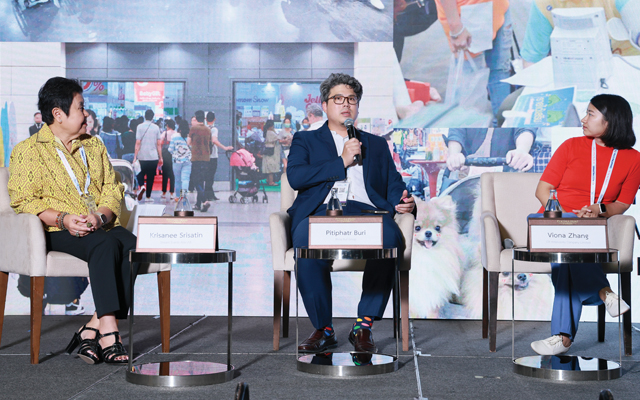Implementing DEIBA that brings about lasting and impactful change is necessary for successful events and business growth.
In the evolving business events landscape, diversity, equity, inclusion, belonging, and accessibility (DEIBA) are no longer just ideals – they are becoming the foundation for sustainable and impactful meetings.
Today, inclusive practices are reshaping the business events landscape, and those embracing universal accessibility are positioning themselves to lead the way forward.

From theory to action
For venues and businesses just beginning their DEIBA journey, Sarah Mathews, managing director of eTourism Frontiers, emphasises starting small and focusing on education.
“What is clear, like with sustainability, is you simply need to start. It doesn’t have to be a major immediate change, but a strategic shift with clear areas for development. Ensure your teams have time and support for adoption and implementation, and ultimately measurement,” she explained.
Pitiphatr Buri, CEO of Bhiraj Buri Group, shared several approaches have worked for his company’s function spaces such as the Bangkok International Trade and Exhibition Centre (BITEC).
“Get involved, get on the ground, gain firsthand experience, and correct things along the way,” he suggests, adding that “accessibility must go beyond compliance to ensure a seamless experience for all attendees”.
Mathews advised venues to avoid paying lip service to DEIBA and instead integrate it into their core mission. “The key is building knowledge and understanding first—even if it’s simply bringing in an expert to talk about it.”
For example, at BITEC, staff modified wheelchair ramps after realising that users needed to take a 200-meter detour to ascend just four meters.
“It’s these small adjustments that make a big difference,” Pitiphatr noted. His team also introduced larger signage for senior attendees.
Diverse measures for diverse participants
Inclusivity is not just a checklist but a long-term strategy that enhances both the attendee experience and an organisation’s reputation.
True inclusivity goes beyond infrastructure – it requires ongoing engagement with attendees.
“Continuously ask if the accommodations provided meet their needs,” Pitiphatr advised. This can be achieved through well-designed application and feedback forms that contain inclusive options.
Mathews noted that inclusivity should also be extended to families, seniors, and individuals with unique requirements, such as children with ADHD.
“Down the line, there is a need – just like with sustainability – to build universally-accessible venues that cater to the different needs of people.
“It’s critical that venues begin building their knowledge and understanding of DEIBA. This could mean starting with small steps like educating teams, but it must eventually evolve into structural changes that accommodate diverse needs,” she added.
While the goal of inclusivity is admirable, Mathews cautioned against overpromising and under delivering: “What I think is a challenge is when (providers) say, ‘We’re a venue for all abilities,’ but actually they are not. What happens then is that it doesn’t tell the clear story, and that, in fact, is worse.”
She also warns against rushing into superficial changes without proper education and team buy-in. “Even if you do something, if the team doesn’t understand why they’re doing it, then adoption normally falls away.”

Overcoming challenges
Max Simpson, CEO and co-founder of the Steps Community – which has worked with the Thailand Convention and Exhibition Bureau (TCEB) and other public sector players on inclusive business events projects – indicated there is “private sector reluctance” to invest in DEIBA.
“It would be beneficial if (the business events sector is actively) engaged, but from our experience, companies rarely want to spend on this,” he noted, attributing the cause to a lack of localised solutions and frameworks that demonstrate return on investment.
Simpson further explained that most research on inclusivity comes from the West, which does not quite fully resonate in Asia.
“Our research centre is developing regional tools to address this gap because, without them, companies won’t allocate resources to implement DEIBA effectively. There’s also risk aversion, stemming from stigma, and negative experiences, due to being unprepared,” he elaborated.
Patrick Both, general manager of Kimpton Maa-Lai Bangkok and regional general manager of IHG luxury & lifestyle, underscores the importance of education around every facet of DEIBA implementation.
“We partner with Steps to foster workplace inclusion, support local communities, and build a diverse workforce. By hiring and celebrating diverse talent, including neurodivergent team members who contribute to meetings, we demonstrate our commitment to inclusivity for both staff and guests,” he shared.
In response as to how to integrate DEIBA successfully and authentically, Both said: “The education piece needs to be there. Sometimes people just aren’t sure (how to practice inclusivity).”
To reflect the company’s efforts at facilitating inclusive events and its commitment to creating a welcoming environment, he said: “We ensure there are accessible facilities, including reserved parking, accessible restrooms and guestrooms, same-floor meeting rooms for easy access, and diverse food options like vegetarian, vegan, Asian, Arabic, and Western cuisines.”

DEIBA in action
A powerful example of inclusive event planning was showcased at the International Association for Suicide Prevention’s 11th Asia Pacific Conference in Bangkok earlier this year, which implemented a comprehensive DEIBA strategy.
The conference offered wheelchair-friendly meeting spaces, gender-neutral restrooms, and a wellness room designed for neurodivergent attendees and those who sought calming environments. The wellness space featured art therapy, soothing music, dim lighting, and refreshments, catering to highly sensitive individuals.
“Dietary accommodations included halal, vegan, vegetarian, and gluten-free options, addressing attendees’ diverse food preferences and restrictions.
“Additionally, the event highlighted underrepresented voices from various cultures, religions, and indigenous communities across Asia Pacific, ensuring fair representation and inclusivity at every level,” shared Patranuch Sudasna, director of CDM-Conference & Destination Management which organised the event.
The way forward
While the business events industry faces challenges, such as managing budget constraints, investing in DEIBA is essential for future growth.
“Businesses that embrace inclusivity are more likely to win opportunities,” Mathews said, noting the increasing demand for accessible and equitable experiences.
“Accessibility is so important because we don’t know who is out there. We want people of all abilities to be able to engage with us, whether it’s our event, our venue, our organisation, or even our website,” concluded Jane Vong Holmes, senior manager at GainingEdge.





















